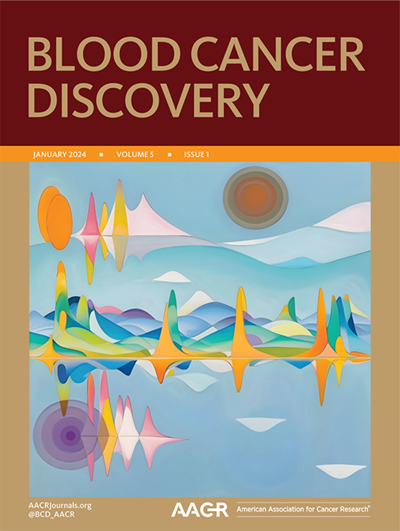Highlighted research articles
IF 11.5
Q1 HEMATOLOGY
引用次数: 0
Abstract
In This Issue| November 01 2023 Highlighted research articles Author & Article Information Online ISSN: 2643-3249 Print ISSN: 2643-3230 ©2023 American Association for Cancer Research2023American Association for Cancer Research Blood Cancer Discov (2023) 4 (6): 419. https://doi.org/10.1158/2643-3230.BCD-4-6-ITI Views Icon Views Article contents Figures & tables Video Audio Supplementary Data Peer Review Share Icon Share Facebook Twitter LinkedIn Email Tools Icon Tools Get Permissions Cite Icon Cite Search Site Article Versions Icon Versions Version of Record November 1 2023 Citation Highlighted research articles. Blood Cancer Discov 1 November 2023; 4 (6): 419. https://doi.org/10.1158/2643-3230.BCD-4-6-ITI Download citation file: Ris (Zotero) Reference Manager EasyBib Bookends Mendeley Papers EndNote RefWorks BibTex toolbar search Search Dropdown Menu toolbar search search input Search input auto suggest Search Advanced Search Anti-BCMA bispecific T-cell engager antibodies (BiTE) have demonstrated impressive efficacy in heavily relapsed multiple myeloma patients; however, infections remain a serious concern with these therapies. In this article, Lancman et al. demonstrate that profound and prolonged hypogammaglobulinemia is universal in patients responding to therapy and is a significant driver of infections. Intravenous immunoglobulin (IVIg) replacement mitigates the risk of serious infections ten-fold. The findings support IVIg as a primary prophylaxis throughout the duration of therapy and raise questions about the optimal schedule and duration of BiTE treatment. See article, p. 440. The combination of azacytidine with venetoclax has become the standard first-line treatment for patients with acute myeloid leukemia (AML) unable to tolerate chemotherapy. However, there is still unmet need for not only identifying poor-responding patients but also identifying effective therapeutic strategies for them. In this precision medicine proof-of-concept study, Eide, Kurtz et al. implement ex vivo screening of... You do not currently have access to this content.重点研究文章
本期| 2023年11月1日重点研究文章作者与文章信息在线ISSN: 2643-3249印刷ISSN: 2643-3230©2023美国癌症研究协会2023美国癌症研究协会血癌发现(2023)4(6):419。https://doi.org/10.1158/2643-3230.BCD-4-6-ITI查看图标查看文章内容图表和表格视频音频补充数据同行评审共享图标共享Facebook Twitter LinkedIn电子邮件工具图标工具获得权限引用图标引用搜索网站文章版本图标版本记录版本2023年11月1日引用突出显示的研究文章。2023年11月1日发现血癌;4(6): 419。https://doi.org/10.1158/2643-3230.BCD-4-6-ITI下载引用文件:Ris (Zotero)参考文献管理器EasyBib Bookends Mendeley Papers EndNote RefWorks BibTex工具栏搜索搜索下拉菜单工具栏搜索搜索输入搜索输入自动建议搜索高级搜索抗bcma双特异性t细胞参与抗体(BiTE)在严重复发的多发性骨髓瘤患者中显示出令人印象深刻的疗效;然而,感染仍然是这些疗法的一个严重问题。在这篇文章中,Lancman等人证明,在对治疗有反应的患者中,深度和长期的低γ -球蛋白血症是普遍存在的,并且是感染的重要驱动因素。静脉注射免疫球蛋白(IVIg)可将严重感染的风险降低十倍。研究结果支持IVIg作为治疗期间的初级预防措施,并提出了关于BiTE治疗的最佳方案和持续时间的问题。见第440页。阿扎胞苷联合venetoclax已成为无法耐受化疗的急性髓系白血病(AML)患者的标准一线治疗方案。然而,不仅需要识别反应不良的患者,而且还需要确定有效的治疗策略。在这项精准医学概念验证研究中,Eide、Kurtz等人实施了…您目前没有访问此内容的权限。
本文章由计算机程序翻译,如有差异,请以英文原文为准。
求助全文
约1分钟内获得全文
求助全文
来源期刊

Blood Cancer Discovery
Multiple-
CiteScore
12.70
自引率
1.80%
发文量
139
期刊介绍:
The journal Blood Cancer Discovery publishes high-quality Research Articles and Briefs that focus on major advances in basic, translational, and clinical research of leukemia, lymphoma, myeloma, and associated diseases. The topics covered include molecular and cellular features of pathogenesis, therapy response and relapse, transcriptional circuits, stem cells, differentiation, microenvironment, metabolism, immunity, mutagenesis, and clonal evolution. These subjects are investigated in both animal disease models and high-dimensional clinical data landscapes.
The journal also welcomes submissions on new pharmacological, biological, and living cell therapies, as well as new diagnostic tools. They are interested in prognostic, diagnostic, and pharmacodynamic biomarkers, and computational and machine learning approaches to personalized medicine. The scope of submissions ranges from preclinical proof of concept to clinical trials and real-world evidence.
Blood Cancer Discovery serves as a forum for diverse ideas that shape future research directions in hematooncology. In addition to Research Articles and Briefs, the journal also publishes Reviews, Perspectives, and Commentaries on topics of broad interest in the field.
 求助内容:
求助内容: 应助结果提醒方式:
应助结果提醒方式:


